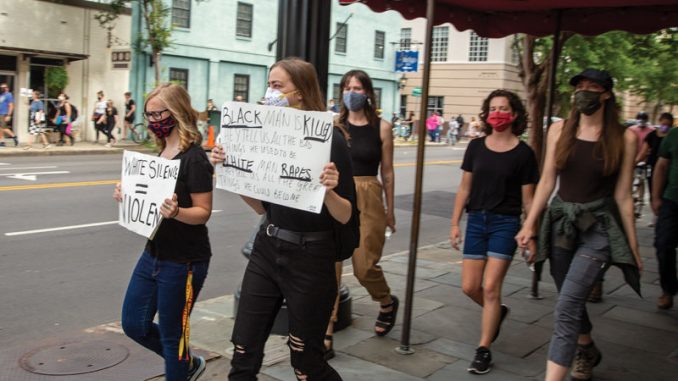
In the wake of protests held in cities nationwide and around South Carolina in the weeks following George Floyd’s death, those who work on the front lines to combat racism and injustice say the real work is just beginning.
Faith-based organizations in the Midlands and Charleston are hoping to harness the momentum started by the protests to further their missions of creating safer, more equitable communities.
Midlands Organized Response for Equity (MORE) and Justice has been working for the past several years to confront issues that affect the poor and marginalized communities in the city of Columbia and in Richland County. The organization includes more than 30 diverse congregations from around the Midlands that regularly meet with each other and with local officials to advocate for improved access to health care and housing. MORE Justice members also work for improvement in education, criminal justice and police reform. In Columbia, members of the Basilica of St. Peter and St. John Neumann Church are particularly active in the organization.
“We’ve been cognizant since our beginnings that every single systemic injustice in our country is founded on racism,” said Kayla Gilchrist, executive director and lead organizer for MORE Justice.
“There are other layers of injustice including issues of income and gender, but you can’t really talk about any important issue without discussing the role that racism plays,” Gilchrist said. “Bias permeates so many of the structures in our communities, and we’re working to change systems so that they are more reflective of God’s kingdom.”
Bishop Robert E. Guglielmone said it is important to remember that racism is evil and considered a serious sin by the Church.
“It is sinful because it attacks the dignity of the human person — we believe that we are created in the image and likeness of God, so any prejudice is sinful,” Bishop Guglielmone said. “We need to look at ourselves first and foremost and eradicate prejudices that we harbor. It’s something we need to do in terms of our lives as Christians.”
The bishop said there are a variety of things people of faith can do to continue the fight against racism and to push for justice for all, including working with legislators, building up dialogue between groups and including lessons about racism and justice in classrooms, especially in religious education and formation.
Gilchrist’s organization is an example of the call to action. On June 1, they held an online day of prayer and action that attracted more than 315 people from 27 congregations who met together via Zoom software. The group refocused on their “Biblical call to do justice” and each participant committed themselves to specific concrete steps to promote safer neighborhoods, police reform and access to affordable housing.
She said MORE Justice is putting particular focus on asking local law enforcement agencies, as well as city and county governments, to commit to a concept called Group Violence Intervention. This program, developed by the National Network for Safe Communities at John Jay College in New York, focuses on reducing violence among young men in communities of color.
Gilchrist said studies have shown that gun violence, including that in the Columbia area, often stems from disputes between loosely organized groups in neighborhoods. These groups should not be confused with gangs, she said, which are often much more organized and have a specific leadership structure. GVI, which has been implemented in many neighborhoods under the name “Operation Cease Fire,” instead focuses on breaking the cycle that causes young people to get caught up in neighborhood violence.
“We know every person is made in God’s image and every person is a child of God, and part of the message behind GVI is that we love you and we want you to be a part of our community,” Gilchrist said. “GVI stresses that violence is unacceptable, and focuses on ways to get these young men engaged in the community.”
MORE Justice also advocates for ongoing mental health training for law enforcement officers in the Midlands to help them learn how to de-escalate situations in a non-violent manner.
Another group that is also using momentum from the protests — focusing especially on the area of policing — is the Charleston Area Justice Ministry, according to Charleston attorney Mavis Huger, who serves on the organization’s board of directors. The Justice Ministry’s members include a diverse base of congregations from around the Charleston area.
Huger said the Justice Ministry was successful in persuading the Charleston Police Department to undergo an audit of its procedures in an effort to detect racial bias, and is still working to get the North Charleston Police Department to undergo its own audit.
Both organizations are also focusing much of their attention on the lack of affordable housing, which Gilchrist and Huger say is at the root of many other problems facing poor and marginalized communities. The groups are actively lobbying local governments to commit resources to an Affordable Housing Trust Fund, which would provide financial incentives for developers to build more affordable housing.
In the Midlands, find out about MORE Justice, its vision and programs at www.morejusticecolumbia.org. In Charleston, learn more about the Charleston Area Justice Ministry at www.charlestonareajusticeministry.org.

